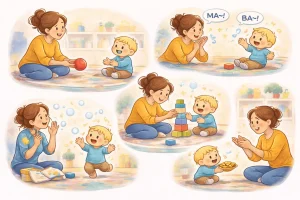How to Help a Child with Speech Delay at Home – Easy Tips
By Rajini D
Last Updated: June 10, 2025
Many children experience speech delays, and while it can feel worrying, early support at home can make a big difference. You don’t need special tools or a degree in therapy — just everyday interactions, simple routines, and a few intentional changes in how you talk, play, and connect with your child. In this article, you’ll discover how to help a child with speech delay at home using proven, parent-friendly strategies. From talking during daily tasks to choosing the right games, we’ll show you how to turn ordinary moments into powerful opportunities for speech growth.
Free Speech Help for Kids
Concerned about speech delays? Book a free consultation with our expert speech therapist and get guidance tailored to your child’s needs.
What is a Speech Delay in Children?
It’s completely natural to wonder if your child’s speech is on track—especially when you notice other toddlers starting to talk more. A speech delay in children simply means that your child is developing speech skills more slowly than expected for their age. It doesn’t necessarily mean there’s a serious problem—but it does mean it’s time to pay attention.
Children develop at their own pace, but there are certain speech and language milestones most reach around the same age. If your toddler isn’t using sounds, babbling much, or starting to say simple words, they might be showing early signs of a speech delay.
Also read: How to Identify and Help Your Child Overcome Speech Delays
Signs of Speech Delay in Toddlers
Wondering what to look out for? Here are some common signs that a toddler is not talking as expected:
- Not babbling or making many sounds by 12 months
- Not saying simple words like “mama” or “dada” by 15 months
- Using fewer than 10–20 words by 18–24 months
- Trouble imitating sounds or gestures
- Not responding to their name or simple instructions
- Frustration or tantrums when trying to express needs
Every child is unique, but if several of these signs apply, it’s worth exploring further. You know your child best—and your instincts matter.
When Should You Be Concerned About a Speech Delay?
So, when should parents worry about speech delay? It’s a common question, and the answer isn’t always black and white. But here are some red flags that suggest it’s time to seek support:
- No words at all by 16–18 months
- Little or no interest in communicating
- Doesn’t try to imitate words or sounds
- Struggles to make needs known
- Regression (losing words they once used)
Why Some Children Have Trouble Talking
If your toddler is behind on their speech milestones, you might be wondering why. There’s no single reason — but understanding the possible causes of speech delay can give you clarity and help you decide what to do next.
The good news? Many children who start talking late catch up with the right support. Knowing what might be causing the delay is the first step.
Common Causes of Speech Delay
Here are some of the most common reasons toddlers may have difficulty talking:
- Hearing Problems: If a child can’t hear well, they may struggle to pick up words and sounds.
- Oral-Motor Challenges: Trouble with the muscles used for speech (lips, tongue, jaw) can make talking difficult.
- Developmental Delays: Sometimes, speech is just one area developing a bit more slowly.
- Autism Spectrum Disorder (ASD): For some children, speech delay is an early sign of autism. It often comes with challenges in social communication.
- Lack of Verbal Stimulation: Children need to hear and interact with language regularly to develop speech. Too much screen time or limited interaction may slow progress.
- Family History: If delayed speech runs in the family, your child might simply be following a similar path.
Know more: Understanding Speech Delay: Causes, Milestones, and Therapy
Speech Delay vs. Language Delay – What’s the Difference?
It’s easy to confuse speech delay with language delay, but they’re not quite the same:
| Term | What It Means | Example |
|---|---|---|
| Speech Delay | Trouble with how words are said | A child knows the word but can’t pronounce it clearly |
| Language Delay | Trouble with what is being said (understanding or using words) | A child doesn’t understand simple instructions or can’t form sentences |
Put simply:
- Speech delay = how your child talks
- Language delay = what your child says and understands
How to Help a Child with Speech Delay at Home – Simple Tips
You don’t need special training to support your child’s speech development — just daily moments filled with connection, play, and talk. These expert-approved strategies are easy to do at home and can make a big difference over time.
Even small changes to your routine can help a lot. Let’s explore what you can start doing today.
Talk to Your Child Often
The more your child hears you speak, the more they learn. Talk to them throughout the day — during meals, bath time, walks, or while getting dressed. Describe what you’re doing (“Let’s put on your shoes!”) or what they’re seeing (“Look at the red ball!”).
Even if your toddler isn’t talking back yet, they’re still listening, absorbing, and learning the rhythm of language.
Use Repetition and Simple Words
Children with speech delays often benefit from hearing the same words again and again. Repeat key words slowly and clearly:
“Ball. This is your ball. You’re throwing the ball!”
Stick to simple, short sentences. It helps your child focus on the important words without feeling overwhelmed.
Read Aloud Every Day
Reading is one of the most powerful ways to build speech and language skills. Choose books with simple stories, bright pictures, and repeated phrases. Point to the pictures and name what you see.
Encourage your child to point, make sounds, or finish familiar lines:
“The wheels on the… (bus!)”
Create a daily reading routine — even five minutes a day makes a difference.
Play Face-to-Face Games
Face-to-face play is great for encouraging eye contact, attention, and turn-taking — all important parts of communication.
Try games like peekaboo, rolling a ball back and forth, or making funny faces. These shared moments build connection and gently nudge your child toward interaction and speech.
Label Things Around the House
Name everyday objects as you use them:
“Cup. This is your cup.”
“Shoes. Let’s wear your shoes.”
You can even create simple picture labels for things like “door,” “bed,” and “toys” to give extra visual cues.
Labeling helps your child link words with objects, boosting vocabulary naturally.
Sing Songs and Rhymes
Songs with actions — like “Twinkle Twinkle” or “If You’re Happy and You Know It” — are fantastic for language learning. The rhythm, repetition, and gestures help toddlers remember words and practice saying them.
Sing slowly, encourage your child to join in, and pause to let them fill in a word or sound.
Home Activities for Toddlers with Speech Delay
Helping your child talk more doesn’t always require therapy centers or formal tools. Many everyday moments can become powerful learning opportunities — especially when you turn them into home speech therapy moments with intention and play.
Creating a language-rich environment at home starts with what your child already loves: play, routine, and time with you.
Best Toys for Speech Development
The right toys can spark imagination, encourage imitation, and build new words. Here are a few types of toys that work well for toddlers with speech delay:
- Pretend Play Sets: Toy kitchens, doctor kits, or animal figurines let you model words like “cook,” “eat,” “hot,” “dog,” and “ouch!”
- Picture Books: Choose books with clear images and simple phrases. Use them to name things and ask questions like, “Where is the cat?”
- Stacking and Sorting Toys: Great for teaching concepts like colors, shapes, and sizes while saying, “big block,” “blue cup,” “on top.”
- Push and Pull Toys: While your child moves around, you can say action words like “go,” “stop,” “pull,” “fast,” and “slow.”
- Musical Toys: Instruments and sound toys help with listening, turn-taking, and responding to rhythm — which all support language growth.
You don’t need fancy or expensive toys. What matters most is how you play together and how often you talk during play.
Read more about our article on How to Identify and Help Your Child Overcome Speech Delays
Everyday Routines That Boost Language Skills
Daily routines are full of chances to boost language — no extra time needed. Here’s how to turn normal activities into speech-boosting routines:
- Mealtime: Name foods, talk about tastes and textures: “Banana – it’s soft. Yum, sweet banana!”
- Bath Time: Say action words like “wash,” “splash,” “wet,” and “dry.” Use toys to add fun conversations.
- Dressing: Label clothing and body parts: “Shirt on. Arms in. Let’s zip it!”
- Outdoor Walks: Point to things you see — “tree,” “bird,” “car,” “flower.” Pause to give your child a chance to repeat.
- Bedtime: Review the day: “Today we played with the ball. You ate a banana. Then we sang songs.” This builds memory and word recall.
When to Seek Help from a Speech Therapist
While every child develops at their own pace, there are times when waiting and hoping might not be enough. If your toddler still isn’t talking much or struggles to communicate clearly, it’s important to know when to take the next step.
Seeing a speech therapist for toddlers can provide clarity, reassurance, and the right plan to help your child move forward. Let’s look at when to seek help and what to expect.
Red Flags You Shouldn’t Ignore
Some signs of speech delay are more serious and may require a professional evaluation. Here are a few red flags that mean it’s time to consult a speech therapist:
- No babbling by 12 months
- Not saying single words by 16–18 months
- Can’t follow simple instructions (like “give me the toy”)
- Doesn’t try to imitate sounds or gestures
- Little interest in communicating or playing with others
- Sudden loss of speech skills they once had
If you’re noticing any of these signs, you’re not overreacting. A gentle, early check-in with a therapist can make a big difference.
What to Expect in a Speech Evaluation
A speech delay diagnosis begins with a friendly evaluation. This is not a test your child can “fail.” It’s a way to understand how your child communicates and where they might need help.
Here’s what usually happens during a speech evaluation:
- Parent Interview: You’ll share your child’s developmental history and your concerns.
- Observation: The therapist may watch how your child plays, speaks, or responds to language.
- Simple Activities: Depending on age, the child might point to pictures, name objects, or follow basic directions.
- Feedback and Plan: The therapist explains what they see, answers your questions, and shares the next steps.
Why Early Support Matters
When it comes to speech delays, early intervention is key. The earlier support begins, the easier it is to close the gap and prevent long-term challenges.
Here’s why starting early matters:
- Brain growth is fastest in the early years — a perfect time to build communication skills.
- Speech habits form early — waiting too long may make it harder to catch up.
- Confidence builds quickly with support — even small progress encourages your child to try more.
Getting help early doesn’t mean something is “wrong.” It means you’re giving your child the best start possible.
Conclusion
If your child isn’t talking yet, don’t worry — you’re not alone. Many parents go through this, and the good news is that early help for speech delays can make a big difference. You don’t need to wait or guess. With the right support, your child can start communicating better and feeling more confident. At Wellness Hub, we offer expert-led speech therapy and support for parents of late talkers. You’ll get simple guidance, step-by-step help, and real results.
Frequently Asked Questions:
1. Is it normal for a 2-year-old not to talk much?
Some 2-year-olds talk less than others, but if your child isn’t using at least 50 words or combining two words (like “want toy”), it could be a sign of a speech delay in toddlers. It’s a good idea to speak with a speech therapist to check what’s going on.
2. What are early signs of speech delay in children?
Early signs include no babbling by 12 months, no words by 16–18 months, trouble following simple directions, or not using gestures like pointing or waving. These signs may show your child needs help with speech and language development.
3. Can I help my child talk more at home?
Yes! You can support your child at home by talking to them often, using simple words, reading daily, and singing songs. These home speech therapy activities can make a big difference over time.
4. What toys help toddlers with speech delay?
Toys like picture books, animal figures, pretend play sets, stacking blocks, and musical toys encourage speaking, listening, and turn-taking. The best toys are open-ended and let you talk while playing.
5. How much screen time is okay for toddlers with speech delay?
Too much screen time can slow speech development. Experts suggest limiting screen time and focusing on face-to-face interaction instead. Talking, reading, and playing with your child helps more than videos.
6. When should I take my child to a speech therapist?
If your child isn’t talking by 18 months or shows signs of delay, it’s best to consult a speech therapist for toddlers. Early help can improve communication and build your child’s confidence.
7. What happens during a speech evaluation?
A speech therapist will observe how your child listens, talks, and plays. They may ask you questions and try simple activities with your child. The goal is to understand your child’s speech level and guide the next steps.
8. Is speech delay always linked to autism?
Not always. While speech delay can be one sign of autism, many children with delayed speech do not have autism. A therapist can help understand the cause and suggest what’s best for your child.
9. How long does it take to see progress in speech therapy?
Every child is different. Some show progress in a few weeks, while others may take longer. The key is consistency — doing speech activities at home and following the therapist’s guidance.
10. Where can I get help for my child’s speech delay?
You can talk to experts at Wellness Hub, where certified speech therapists support parents and children online or in-person. You can also book a free consultation to understand what your child needs.
About the Author:
Rajini Darugupally
M.Sc., Speech-Language Pathologist (9+ years of experience)
Rajini is a passionate and dedicated Speech-Language Pathologist with over 9+ years of experience, specializing in both developmental speech and language disorders in children and rehabilitation in adults. Driven by a desire to empower each individual to find their voice, Rajini brings a wealth of experience and a warm, genuine approach to therapy. Currently, at Wellness Hub, she thrives in a team environment that values innovation, compassion, and achieving results for their clients.
Book your Free Consultation Today
Parent/Caregiver Info:
Client’s Details:
* Error Message









